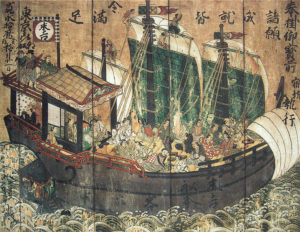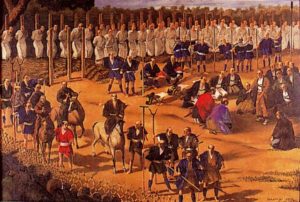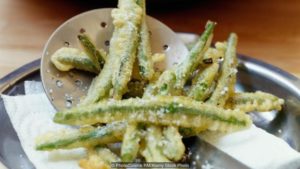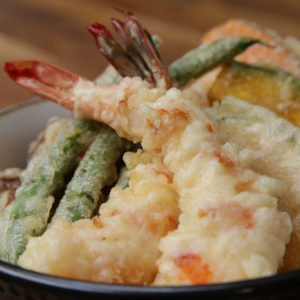When the Portuguese sailed to Japan in the 16th-Century, they brought a special dish with them. Today called tempura.
 In 1543 a Chinese ship with three Portuguese sailors on board – António da Mota, Francisco Zeimoto and António Peixoto – heading for Macau was swept off course and ended up on the Japanese island of Tanegashima. The Japanese were in the middle of civil war and eventually began trading guns with the Portuguese. This way the first trading post in Japan became a fact.
In 1543 a Chinese ship with three Portuguese sailors on board – António da Mota, Francisco Zeimoto and António Peixoto – heading for Macau was swept off course and ended up on the Japanese island of Tanegashima. The Japanese were in the middle of civil war and eventually began trading guns with the Portuguese. This way the first trading post in Japan became a fact.
 The Portuguese remained in Japan for nearly a century – until 1639 – when they were kicked out and a few hundred Christians (missionaries and converted Japanese) killed because the ruling shogun Tokugawa believed Christianity to be a threat to the Japanese ancestral traditions.
The Portuguese remained in Japan for nearly a century – until 1639 – when they were kicked out and a few hundred Christians (missionaries and converted Japanese) killed because the ruling shogun Tokugawa believed Christianity to be a threat to the Japanese ancestral traditions.
After their ships sailed away the Portuguese left behind a fried green bean recipe called peixinhas da horta ( little fish of the garden), in Japan called tempura.
 Peixinhos da horta was often eaten during Lent – the 40-day period before Easter that in Christianity is devoted to fasting and abstinence – when the church dictated that Catholics were not allowed to eat meat.
Peixinhos da horta was often eaten during Lent – the 40-day period before Easter that in Christianity is devoted to fasting and abstinence – when the church dictated that Catholics were not allowed to eat meat.
The word tempura comes from the Latin tempora, a term referring to the time of fasting. If you are not allowed to eat meat during that period, fried green beans are a good alternative.
But it had other functions too. When the poor couldn’t afford fish, they would eat these beans as a substitute, explains Lisbon’s Michelin-starred chef José Avillez in BBC Travel. Sailors also used to fry the beans to preserve them during their long journeys.

The Japanese lightened the batter –eggs, flour and ice-cold water! – and changed the fillings. Today everything from shrimp to sweet potatoes is turned into tempura. The Japanese inherited the dish from the Portuguese but made it far better.
Feliz Páscoa Happy Easter (pic Observador)
